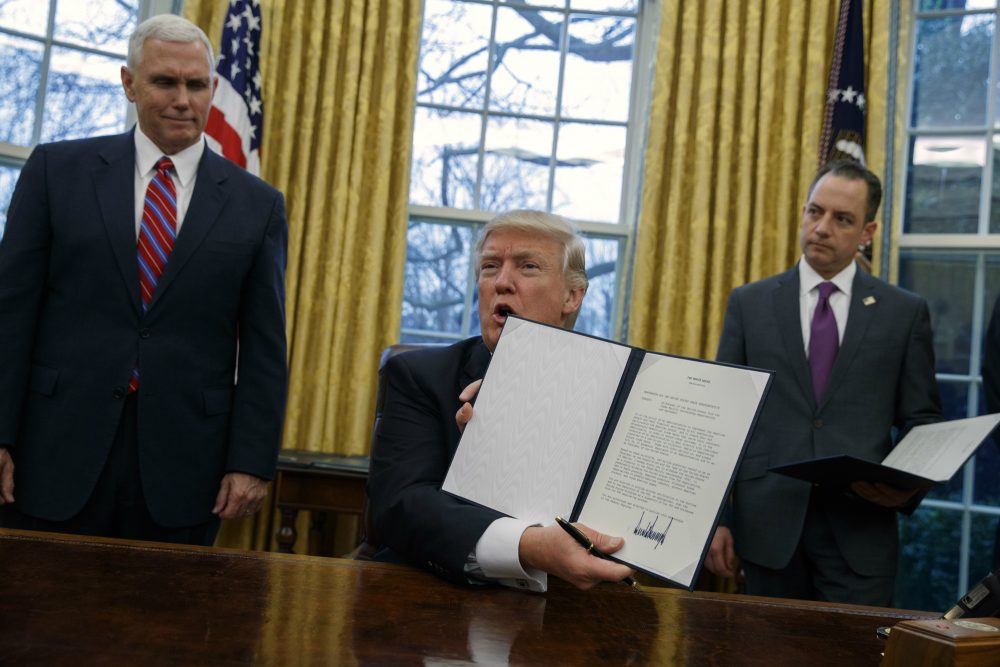Advertisement
President Trump's First Executive Orders, And His Worrying Imperviousness To Facts

COMMENTARY
As the first weekday of the Trump Administration dawned, the news was all about our new president’s bid to outdo Burger King in cooking up whoppers. With Team Trump’s inaccurate crowd counts and “alternative facts” becoming punchlines, the ensuing hours gave us some hard news: a cascade of presidential memoranda addressing major issues.
It looks like the administration’s alternative-facts worldview isn’t confined to counting crowd sizes.
Trump's imperviousness to evidence fits a broader pattern that could wind up hurting the economy and Americans.
The headline-grabber among Trump’s orders dealt with trade. He withdrew the United States from the Trans-Pacific Partnership (TPP), the trade deal with a dozen nations negotiated by his predecessor. The decision amounted to the proverbial kicking-a-dead-horse, as President Obama never submitted the agreement for ratification, knowing it faced long odds. But withdrawal fulfilled one of Trump’s signature campaign promises.
The TPP’s demise is less important on its own than for what it portends. Trump’s rationale for killing it, and other actions (which I'll get to) he’s taken in his first week in office, suggest we’re in for a four-year joyride with a driver heedless of policy-making’s normal speed limit: the thoughtful consideration of evidence.
Trump did not oppose the TPP out of public safety and environmental concerns that might justify opposition. While I think the president got the TPP wrong, it was a judgment call that he is entitled to make. In a world that, with a few exceptions, has embraced free trade, the economic gains from the TPP were likely to be modest, as will be any losses from abandoning it.
Still, Trump’s decision to scrap the deal should worry you.
First, withdrawing from the TPP passes up a chance to educate the public out of its free trade paranoia — reminding Americans, for example, that the withering of our manufacturing began long before big trade deals and owes as much or more to automation and the value of the dollar. Of course, an economics lesson was too tall an order for a president who shares and channels the public paranoia.
More ominously, Trump's imperviousness to evidence fits a broader pattern that could wind up hurting the economy and Americans.
On the same day he killed the TPP, Trump threatened to impose “border” taxes on companies that close American plants and shift jobs elsewhere. Looking at his targets doesn’t reassure you about his aim. One he’s mentioned, BMW, isn’t even closing American plants, but shifting them from Germany and elsewhere to Mexico. Legal experts say courts would probably invalidate a border tax on the car maker.
Trump’s threatened tariffs on Chinese and Mexican imports would surely provoke retaliation from two nations that buy, respectively, $110 billion of U.S. exports (third among our trade partners) and $250 billion (second). He’s also talked about renegotiating or leaving NAFTA, even though our trade deficit with our two NAFTA partners, Canada and Mexico, is mostly due to our buying their oil and gas for our voracious energy appetite. Shorn of those imports, the trade books are closer to balance.
In short, Trump is blustering at a lot of countries. We can thrive without a TPP; a multi-front trade war is something else.
If Trump's administration could be bad for American wealth, wait until he gets his hands on Americans’ health. In another executive action, he signed what The New York Times called a "mission statement" to go after Obamacare, despite the lack of any feasible replacement to cover the 20 million who gained insurance under the law.
If Trump's administration could be bad for American wealth, wait until he gets his hands on Americans’ health.
Taking the blue ribbon for rejection of evidence, however, was the White House decision to take down its climate change page after the inauguration. In its place is a manifesto reiterating Trump’s science-be-damned pledge to eliminate Obama’s crucial Climate Action Plan. (Environmentalists will boo too Trump’s resurrecting the Keystone XL pipeline, but that’s a sideshow, its economic benefits and environmental harm exaggerated by supporters and opponents alike.)
All of this reality-denying is playing with dynamite. Yes, politicians should honor their campaign promises, and Trump opposed trade deals and Obamacare and called climate change a “hoax.” But it’s allowable, and necessary, for a president to change his mind in light of evidence, or when he’s won his election and doesn’t need to pander. In that regard, this president could learn from his predecessor, who campaigned on a vow to renegotiate NAFTA. A spokesman had to reassure our Canadian friends that Obama wouldn’t carry through.
When he won the White House, he didn’t.
